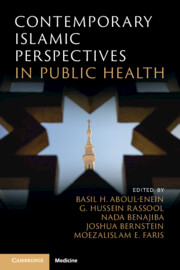Book contents
- Contemporary Islamic Perspectives in Public Health
- Reviews
- Contemporary Islamic Perspectives in Public Health
- Copyright page
- Contents
- Contributors
- About the Editors
- Acknowledgments
- Chapter 1 Introduction to Islam
- Chapter 2 The Qur’an and Prophetic Guidance: An Overview in the Context of New Public Health
- Chapter 3 Islamic Applications towards Public Health Policies: A Brief Perspective
- Chapter 4 Islamic Prayer (Salat) and Health
- Chapter 5 Perceptions of Health Behaviors and Illness in Muslims
- Chapter 6 Social Justice, Human Rights, and Equality: An Islamic Perspective
- Chapter 7 Public Health, Hygiene, and Islam
- Chapter 8 Foods of the Qur’anic Garden: An Islamic Perspective
- Chapter 9 Recommended Eating and Dietary Practices in Islam
- Chapter 10 Islamic Food Law and Dietary Restrictions
- Chapter 11 Ramadan Intermittent Fasting: A Contemporary Health Perspective
- Chapter 12 Promoting Oral Health: Influences of Hadith and Sunnah
- Chapter 13 Coping and Mental Health: Islamic Practices and Beliefs
- Chapter 14 Maternal and Child Health: An Islamic Perspective
- Chapter 15 Immunization and Islamic Guidance
- Chapter 16 Sexual and Reproductive Health: An Islamic Perspective
- Chapter 17 Zakat and Waqf: Towards Achieving Sustainability, Health, and Well-Being
- Chapter 18 Earth and the Environment: Islam and Stewardship
- Chapter 19 Sleep and Health: An Islamic Perspective
- Chapter 20 Addictive Behaviors and Public Health
- Chapter 21 Highlighting the Concepts, Principles, and Values of Communication: A Brief Islamic Perspective
- Chapter 22 Contemporary Public Health, Islam, and Positive Health
- Chapter 23 Cultural Competence in Public Health: A Brief Islamic Perspective
- Chapter 24 Muslims and Non-Muslims: Perspectives on Immigrant and Minority Health
- Chapter 25 Challenges and Solutions in Public Health: An Islamic Perspective
- Index
- References
Chapter 13 - Coping and Mental Health: Islamic Practices and Beliefs
Published online by Cambridge University Press: 02 January 2025
- Contemporary Islamic Perspectives in Public Health
- Reviews
- Contemporary Islamic Perspectives in Public Health
- Copyright page
- Contents
- Contributors
- About the Editors
- Acknowledgments
- Chapter 1 Introduction to Islam
- Chapter 2 The Qur’an and Prophetic Guidance: An Overview in the Context of New Public Health
- Chapter 3 Islamic Applications towards Public Health Policies: A Brief Perspective
- Chapter 4 Islamic Prayer (Salat) and Health
- Chapter 5 Perceptions of Health Behaviors and Illness in Muslims
- Chapter 6 Social Justice, Human Rights, and Equality: An Islamic Perspective
- Chapter 7 Public Health, Hygiene, and Islam
- Chapter 8 Foods of the Qur’anic Garden: An Islamic Perspective
- Chapter 9 Recommended Eating and Dietary Practices in Islam
- Chapter 10 Islamic Food Law and Dietary Restrictions
- Chapter 11 Ramadan Intermittent Fasting: A Contemporary Health Perspective
- Chapter 12 Promoting Oral Health: Influences of Hadith and Sunnah
- Chapter 13 Coping and Mental Health: Islamic Practices and Beliefs
- Chapter 14 Maternal and Child Health: An Islamic Perspective
- Chapter 15 Immunization and Islamic Guidance
- Chapter 16 Sexual and Reproductive Health: An Islamic Perspective
- Chapter 17 Zakat and Waqf: Towards Achieving Sustainability, Health, and Well-Being
- Chapter 18 Earth and the Environment: Islam and Stewardship
- Chapter 19 Sleep and Health: An Islamic Perspective
- Chapter 20 Addictive Behaviors and Public Health
- Chapter 21 Highlighting the Concepts, Principles, and Values of Communication: A Brief Islamic Perspective
- Chapter 22 Contemporary Public Health, Islam, and Positive Health
- Chapter 23 Cultural Competence in Public Health: A Brief Islamic Perspective
- Chapter 24 Muslims and Non-Muslims: Perspectives on Immigrant and Minority Health
- Chapter 25 Challenges and Solutions in Public Health: An Islamic Perspective
- Index
- References
Summary
Muslims structure their everyday lives and religious practices around Allah, believing that whatever happens, it is His will. Islam enables Muslims to cope with everyday life, especially when challenges occur, assisting in reducing levels of anxiety and reactive depression. The use of the Qur’an and Islamic teachings and guidance promotes positive religious coping, which is positively associated with desirable mental health and well-being indicators. Western psychiatry and psychology are attempting to move away from a biomedical model of care, but they still struggle to incorporate Islamic teachings and guidance and positive religious coping in treatment planning. Designing culturally competent mental health services involves accommodating and addressing Islamic beliefs and practices of Muslim patients to increase positive religious coping and develop more culturally congruent care.
Keywords
- Type
- Chapter
- Information
- Contemporary Islamic Perspectives in Public Health , pp. 80 - 85Publisher: Cambridge University PressPrint publication year: 2025

